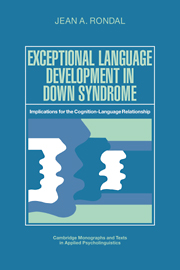2 results in Cambridge Monographs and Texts in Applied Psycholinguistics
Advances in Applied Psycholinguistics
-
- Published online:
- 19 June 2010
- Print publication:
- 25 September 1987

Exceptional Language Development in Down Syndrome
- Implications for the Cognition-Language Relationship
-
- Published online:
- 23 December 2009
- Print publication:
- 28 April 1995

